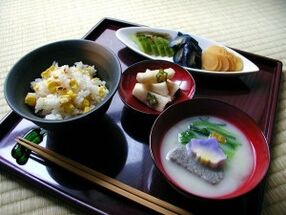The Japanese diet originated in one of the diet clinics in this country.
The authors of this system claim that it completely reconfigures the metabolism of the human body, after which the lost excess weight does not return for at least a couple of years.
Basic principles of the Japanese diet

A prerequisite for using the Japanese diet is the complete rejection of all types of alcohol, a ban on the use of salt and sugar, flour products and confectionery.
A certain diet plan, designed in two weeks, must be strictly adhered to: it is necessary to consistently follow the proposed menu all these days.
The authors of the diet believe that deviating from the diet can change the metabolism in an unnecessary direction. One of the conditions of the Japanese diet is that you drink a liter and a half of plain water every day.
Here is an example of the first day according to the proposed menu of the Japanese diet:
- breakfast - coffee;
- lunch - a couple of eggs with one tomato or 200 g of tomato juice, fresh cabbage salad;
- dinner - fish, 200 g and cabbage salad.
From this example alone, it can be seen that diet is not a common Japanese cuisine at all. In Japan, carbohydrates are preferred, mainly in the form of cereals, and they also eat a lot of seafood, vegetables and fruits. According to many doctors, this type of diet provides the Japanese with a longer lifespan.
In the Japanese diet, the 14-day menu pays very little attention to carbohydrates, which are the main source of energy, which means that the body, in search of new ways to supplement, will begin to consume those protein reserves that are available to it. in muscle tissue.
As a result, fat is not lost, but muscle is lost. The situation is not changed by increased protein intake, which further burdens the kidneys.
Menu for all 14 days
first:
- Breakfast - coffee, one cup.
- Lunch - two eggs, cabbage salad with butter, tomato juice.
- Dinner - fish with olive oil.
Second:
- Breakfast - coffee and black bread.
- Lunch - fish 200 g.
- Dinner - 100g of cooked beef with a glass of yogurt.
Third:
- Breakfast - coffee with crackers.
- Lunch - zucchini, fried in oil.
- Dinner - two hard-boiled eggs, cabbage salad, 150 g of boiled beef.
fourth:
- Breakfast is coffee.
- Lunch - hard boiled egg, 3-4 pieces of boiled carrot, olive oil, a piece of hard cheese.
- Dinner - a moderate amount of fruit, except bananas with grapes.

fifth:
- Breakfast - grated carrot, lemon juice.
- Lunch - fish 200 grams, tomato juice.
- Dinner - fruit, except bananas with grapes.
sixth:
- Breakfast is coffee.
- Lunch - 200 grams of cooked chicken and cabbage salad in oil.
- Dinner - a couple of hard-boiled eggs, raw carrot salad with butter.
the seventh:
- Breakfast - green tea.
- Lunch - 200g of beef, some fruit, except bananas with grapes.
- Dinner - any option for dinner this week, except the third day.
eighth:
- Breakfast is coffee.
- Lunch - boiled chicken - 250 g, cabbage salad in oil.
- Dinner - two hard-boiled eggs, carrot salad (200 g), olive oil.

ninth:
- Breakfast - raw grated carrot, lemon juice.
- Lunch - fish, tomato juice.
- Dinner - various fruits (except bananas with grapes).
tenth:
- Breakfast is coffee.
- Lunch - boiled egg and 3-4 boiled carrots, olive oil, a piece of hard cheese.
- Dinner - a variety of fruits except bananas with grapes.
eleventh:
- Breakfast - coffee with crackers.
- Lunch - slices of zucchini, fried in oil.
- Dinner - two eggs, cabbage salad with butter, boiled beef 200 gr.
twelfth:
- Breakfast - coffee and crackers.
- Lunch - 200 grams of fish, vegetable salad, cabbage with butter.
- Dinner - drink 100 grams of beef with a glass of kefir.
thirteenth:
- Breakfast is coffee.
- Lunch - two eggs, cabbage salad in oil, tomato juice.
- Dinner - 200 g of fish,
Fourteenth, last day:
- Same menu as the 13th day.
Nutritionist's comment
The proposed diet is obviously a lack of leading trace elements - calcium, magnesium, potassium, which the body needs for full functioning.
There is also a lack of iron without which hematopoietic organs cannot function. Vitamins A, B, C are also missing. If there are not enough of them in the body, a person's appearance worsens, efficiency decreases, and the work of endocrine glands and digestive organs is disturbed.
The low-calorie and monotony of the Japanese 14-day diet can lead to relapse and overeating. After the first week of using such a diet, sleep disturbance and reduced performance may be noticed.
Black coffee included in the Japanese diet is a controversial product. Japanese cuisine does not use coffee at all. People with cardiovascular disease should be careful with drinking coffee.






























